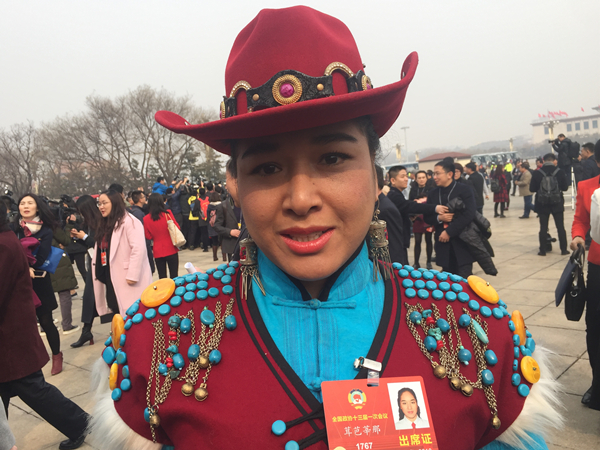Pumi singer urges nation to preserve heritage of ethnic minorities
- By Zhang Rui
 0 Comment(s)
0 Comment(s) Print
Print E-mail China.org.cn, March 12, 2018
E-mail China.org.cn, March 12, 2018
A folk singer from the Pumi ethnic minority said in Beijing on Saturday that she hopes China can protect and record the cultural heritage of ethnic groups with smaller populations.

Rongbaxinna, a member of the 13th Chinese People's Consultative Conference National Committee(CPPCC), is from the Pumi ethnic group in Yunnan Province. "I initiated the proposal, which was endorsed by other ethnic minority political advisors," she said.
She praised the efforts made by the central government to help minorities through various polices in recent years, but said even more can be done. "We hope the country can pay more attention to it, make more efforts and arrange more funds to protect our traditional cultures and heritage."
China has 56 ethnic groups in total, half of which have relatively small populations. There are only about 40,000 people in the Pumi ethnic group, for instance, and another 27 groups are represented by a population of fewer than 300,000. Rongbaxinna emphasized that the cultural heritage of these 28 smaller ethnic groups should be preserved as soon as possible.
"I hope there will be a national-level archive and database soon to record and preserve these 28 ethnic groups' traditional cultures, especially those that only have oral languages and intangible traditional cultures that have not yet been recorded in written languages," she said, revealing that the Pumi group, as an example, has no written language.
Rongbaxinna said that in ethnic groups with a smaller populations, the oral tradition and the various art forms are the key to understanding the cultures, as well as providing a platform to display them.
Oral cultures are cultural traditions passed down from generation to generation by intellectuals, elders and artists in the form of speeches, folk tales, proverbs and folk songs. They constitute not only intangible cultural heritage, but also the collective memories and living historical records of these ethnic groups.
The significance of the heritage archiving work is not only about recording, said Rongbaxinna, explaining that it is not a simple task of preserving data, but a more significant duty to convey its artistic value. She also suggested the archiving work should include studio recording, translation, multi-media display, performances and promotion nationwide.
Rongbaxinna, 38, rose to stardom in 2006 through a youth singing contest on China Central Television. She was invited to perform at the Kremlin in 2013 when state leaders of China and Russia met.
She underscored that as a unified country of 56 ethnic groups, China must count its ethnic minorities as "an integral part of the Chinese nation." She added, "Without the prosperity and development of ethnic minority culture, the prosperity of the entire Chinese national culture cannot be realized."






Go to Forum >>0 Comment(s)